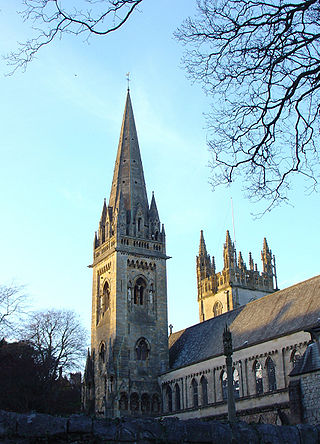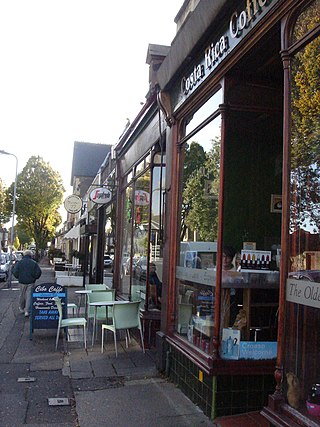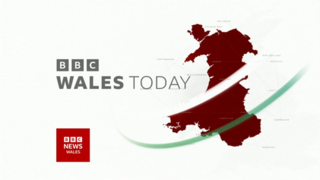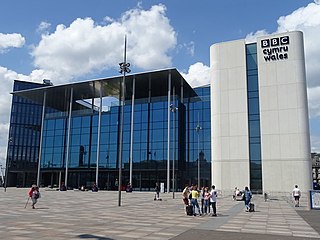
Llandaff is a district, community and coterminous electoral ward in the north of Cardiff, capital of Wales. It was incorporated into the city in 1922. It is the seat of the Bishop of Llandaff, whose diocese within the Church in Wales covers the most populous area of Wales.

Pobol y Cwm is a Welsh-language soap opera produced by the BBC since October 1974. The longest-running television soap opera produced by the BBC, Pobol y Cwm was originally transmitted on BBC Cymru and later transferred to the Welsh-language station S4C when it opened in November 1982.

Pontcanna is an inner-city district and community in the west of Cardiff, Wales. It is located adjecent to Canton, Cardiff. It is also located a short distance to the city centre, and its borders are approximately indicated by Western Avenue, the River Taff, Cowbridge Road East and Llandaff Road.

BBC Cymru Wales is a division of the BBC and the main public broadcaster in Wales.

BBC Wales Today is the BBC's national television news programme for Wales, broadcast on BBC One Wales from the headquarters of BBC Cymru Wales in Central Square, Cardiff. According to the BBC, it is the world's longest-running television news programme.

ITV News Wales at Six is the evening news programme broadcast and produced by ITV Cymru Wales.

BBC One Wales is a Welsh free-to-air television channel owned and operated by BBC Cymru Wales. It is the Welsh variation of the UK-wide BBC One network and is broadcast from Central Square in Cardiff.

Television in Wales began in 1952. Initially, all programmes were in English with occasional Welsh language programmes. In 1982 Welsh language channel S4C was launched. The digital switchover happened in 2009-2010 and S4C became an exclusively Welsh language channel.
As the capital of Wales, media in Cardiff plays a large role in the city and nationwide. Employment in the sector has grown significantly in recent years, and currently provides employment for 2.1% of the city's workforce – higher than the level across Wales (1.1%) and marginally lower than that across Great Britain as a whole (2.2%).

Ffeil is a Welsh language television news programme for children and young people, produced by BBC Cymru Wales for S4C.

Architecture in Cardiff, the capital city of Wales, dates from Norman times to the present day. Its urban fabric is largely Victorian and later, reflecting Cardiff's rise to prosperity as a major coal port in the 19th century. No single building style is associated with Cardiff, but the city centre retains several 19th and early 20th century shopping arcades.

The Cardiff School of Journalism, Media and Culture (JOMEC) is Cardiff University's school for training in media. It is one of the journalism schools whose main universities are part of the Russell Group. It was founded as the Cardiff Journalism School in 1970 by Sir Tom Hopkinson and is the longest established postgraduate centre of journalism education in Europe. The school is considered one of the best training centres for journalists and is often described as the "Oxbridge of journalism".

BBC Roath Lock Studios is a television production studio that houses BBC drama productions including Doctor Who, Casualty, and Pobol y Cwm. The centre topped out on 20 February 2011 and filming for such productions commenced in autumn of the same year.
Central Square is a large public space in Cardiff, Wales, adjacent to Cardiff Central railway station and included Cardiff Central bus station between 1954 and 2015. It was redeveloped and extended in the late 2010s and early 2020s.

Art in Cardiff refers to the culture of visual arts in Cardiff, capital city of Wales. The visual arts in Cardiff have a much more recent history than many British cities, due to it being a very small town until rapid growth took place in the mid nineteenth century. Cardiff School of Art originated in 1865 and the first major public art exhibition took place in 1870. The town became a city in 1905, after which time it gained further importance, for example with the creation of a new National Museum. Into the 21st century it has a thriving art scene.

BBC Cymru Wales New Broadcasting House, previously known as the BBC Cymru Wales headquarters building, is the headquarters of BBC Cymru Wales in Central Square, Cardiff. It operates many of its broadcasting services from there using IP-based studios. It also serves as a base for S4C.
This is a timeline of the history of television in Wales. It does not include events that affect the whole UK.

Cardiff Bus Interchange (CBI) is a bus and transport interchange in the centre of Cardiff and forms part of The Interchange development, which also includes Wood Street House at the northern end with 318 for-rent apartments, two floors of office space, and four retail units on the ground floor.




















